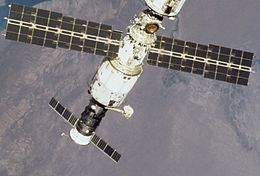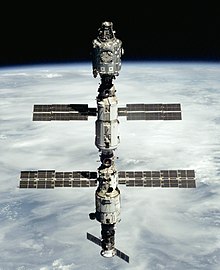cosmos.wikisort.org - Spacecraft
Progress M1-3, identified by NASA as Progress 1P, was the first Progress spacecraft to visit the International Space Station. It was a Progress-M1 11F615A55 spacecraft, with the serial number 251.[1]
 Progress M1-3 docked with the ISS, seen from STS-106. | |
| Mission type | International Space Station resupply |
|---|---|
| Operator | Roskosmos |
| COSPAR ID | 2000-044A |
| SATCAT no. | 26461 |
| Mission duration | 77 days |
| Spacecraft properties | |
| Spacecraft type | Progress-M1 s/n 251 |
| Manufacturer | RKK Energia |
| Start of mission | |
| Launch date | 6 August 2000, 16:26:42 UTC |
| Rocket | Soyuz-U |
| Launch site | Baikonur, Site 1/5 |
| End of mission | |
| Disposal | Deorbited |
| Decay date | 1 November 2000, 07:53:20 UTC |
| Orbital parameters | |
| Reference system | Geocentric |
| Regime | Low Earth |
| Perigee altitude | 357 km |
| Apogee altitude | 369 km |
| Inclination | 51.6° |
| Period | 91.8 minutes |
| Epoch | 6 August 2000 |
| Docking with ISS | |
| Docking port | Zvezda aft |
| Docking date | 8 August 2000, 20:12:56 UTC |
| Undocking date | 1 November 2000, 04:04:49 UTC |
| Time docked | 75 days |
Progress ISS Resupply | |
Launch
Progress M1-3 was launched by a Soyuz-U carrier rocket from Site 1/5 at the Baikonur Cosmodrome. Launch occurred at 16:26:42 UTC on 6 August 2000.[1] The spacecraft docked with the aft port of the Zvezda module at 20:12:56 UTC on 8 August.[2][3]
Undocking
It remained docked for 75 days before undocking at 04:04:49 UTC on 1 November to make way for Soyuz TM-31.[2] It was deorbited at 07:05:00 UTC on the same day.[2] The spacecraft burned up in the atmosphere over the Pacific Ocean, with any remaining debris landing in the ocean at around 07:53:20 UTC.[2][4]
Progress M1-3 carried supplies to the International Space Station. It was unloaded during the Space Shuttle missions STS-106 and STS-92, as the ISS did not yet have a permanent crew. The Expedition 1 crew arrived the day after Progress M1-3 departed the Station, using the docking port that it had vacated.

See also
- List of Progress flights
- Uncrewed spaceflights to the International Space Station
References
- McDowell, Jonathan. "Launch Log". Jonathan's Space Page. Retrieved 7 June 2009.
- Anikeev, Alexander. "Cargo spacecraft "Progress M1-3"". Manned Astronautics - Figures & Facts. Archived from the original on 18 October 2007. Retrieved 7 June 2009.
- Wade, Mark. "Progress M1". Encyclopedia Astronautica. Archived from the original on 12 June 2002. Retrieved 7 June 2009.
- McDowell, Jonathan. "Satellite Catalog". Jonathan's Space Page. Retrieved 7 June 2009.
На других языках
- [en] Progress M1-3
[ru] Прогресс М1-3
Прогресс М1-3 — транспортный грузовой космический корабль (ТГК) серии «Прогресс», запущен к Международной космической станции. Первый по программе МКС российский корабль снабжения и третий новый модифицированный ТГК.[1] Серийный номер 251.Другой контент может иметь иную лицензию. Перед использованием материалов сайта WikiSort.org внимательно изучите правила лицензирования конкретных элементов наполнения сайта.
WikiSort.org - проект по пересортировке и дополнению контента Википедии
